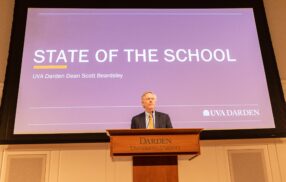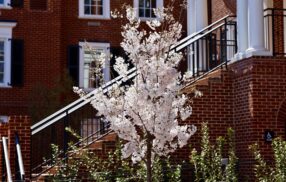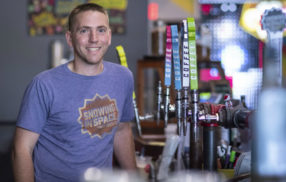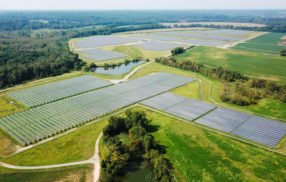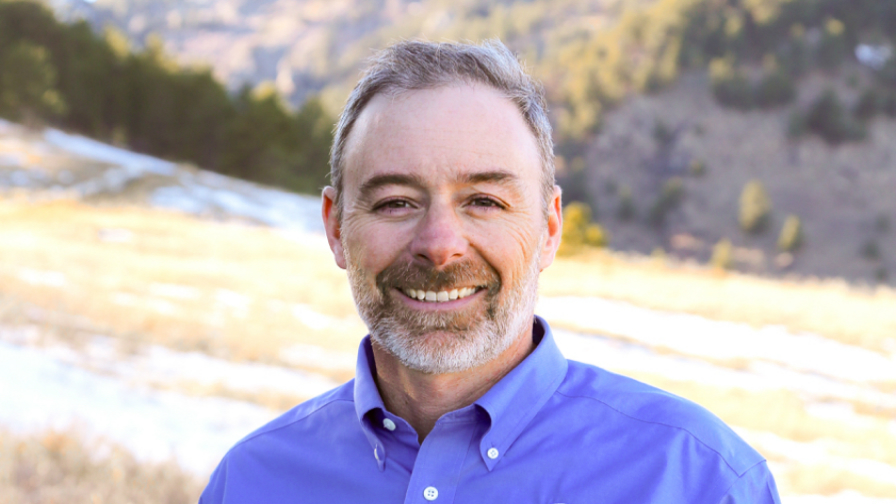
Following Footsteps of Famed Farming Family, Darden Alumnus Leads Niman Ranch Into Future of Sustainable Livestock
By Seb Murray
University of Virginia Darden School of Business alumnus Chris Oliviero (MBA ’07), could not believe his eyes in 2006 when Darden Professor Andrea Larson showed him a photo of the Great Pacific garbage patch — a floating “island” of trash in the ocean that is now twice the size of Texas. “It was eye opening,” recalls Oliviero of Larson’s sustainability class.
The father of three adds: “How can you not want to do your part, to try to improve the condition of the environment for future generations?”
The MBA class ignited Oliviero’s passion for environmental sustainability in farming — a business that is in his blood. Oliviero is a fourth-generation member of the Perdue family, renowned for farming in the United States. Oliviero’s great-grandfather Arthur W. Perdue started selling eggs from his backyard in Salisbury, Maryland, in 1920. Today the business, Perdue Farms, and its family of premium brands is a household name in the U.S. It produces chicken, turkey, pork, beef and lamb products, and has annual sales in excess of $6.6 billion.
Since 2007, Oliviero has served in various leadership positions at Perdue, including in plant management and sales, most recently as vice president, sales and business development for its premium poultry products.
He pioneered the company’s environmental sustainability strategy and helped to launch and grow Perdue’s Harvestland brand of antibiotic-free and organic chicken into a $280 million brand. In February 2019, he took on the role of general manager of Perdue-owned Niman Ranch, which sources beef, lamb and pork from some 740 independent family farmers and ranchers across the U.S. who treat animals humanely and farm in environmentally sustainable ways. It sells the premium products to specialty retailers such as Whole Foods, in addition to top chefs at renowned restaurants throughout the country.
Oliviero says there is both a moral and business case for sustainability in farming. Consumers want more transparency and traceability in their meat and are willing to pay for it. More than 100 retailers and foodservice providers in the U.S., for example, have committed to only purchasing chicken that meets welfare standards by 2024, dubbed the “Class of 2024.”
“Environmental sustainability is a core pillar of Niman Ranch. It’s a big part of the success Niman Ranch has enjoyed,” says Oliviero.
One of his key goals is to support the next generation of farmers. With the average age of farmers in the U.S. increasing to 59, there could be a future supply crunch of meats that meet Niman Ranch’s high standards. “The average age of a Niman Ranch farmer is currently 43 years old. Backing future generations of farmers is critical to the sustainability and viability of our food supply,” says Oliviero. “We want to double the number of farmers we work with to roughly 1,500 in the next decade.”
The company supports new farmers through the Niman Ranch Next Generation Foundation, which provides scholarships to kids who go to college and return to farming, or other work that revitalizes rural communities.
Oliviero started his career as a business consultant for Fortune 100 brands including FedEx, Toyota, BMW, Heinz and Molson. He did not want to join his family’s successful business immediately and possibly regret not exploring his options. He has drawn on his experience as a consultant in his role at Niman Ranch, for instance, working with online startup ButcherBox, a monthly meat delivery service, to broaden the number of customers.
“More consumers do their shopping for meat and groceries online,” says Oliviero. “In consulting, we were always trying to identify what customer trends were and how the marketplace was changing, to stay ahead of the curve of change.”
Also important was his time at Darden, where he studied for an MBA between 2005 and 2007. The degree taught him the nuts and bolts of business — essential know-how for a general management job. “The breadth of the curriculum and the quality of professors and diversity of other students was unparalleled. I’ve drawn on it over the past 12 years,” says Oliviero.
He regularly reached out to Professor Larson, for instance, who provided tips on how Oliviero could chair an environmental steering committee at Perdue Farms. This included establishing clear goals. “It seems basic, but when you start out at a new company, it can be intimidating. Knowing I had someone to call on was really important.”
The University of Virginia Darden School of Business prepares responsible global leaders through unparalleled transformational learning experiences. Darden’s graduate degree programs (MBA, MSBA and Ph.D.) and Executive Education & Lifelong Learning programs offered by the Darden School Foundation set the stage for a lifetime of career advancement and impact. Darden’s top-ranked faculty, renowned for teaching excellence, inspires and shapes modern business leadership worldwide through research, thought leadership and business publishing. Darden has Grounds in Charlottesville, Virginia, and the Washington, D.C., area and a global community that includes 18,000 alumni in 90 countries. Darden was established in 1955 at the University of Virginia, a top public university founded by Thomas Jefferson in 1819 in Charlottesville, Virginia.
Press Contact
Molly Mitchell
Associate Director of Content Marketing and Social Media
Darden School of Business
University of Virginia
MitchellM@darden.virginia.edu



